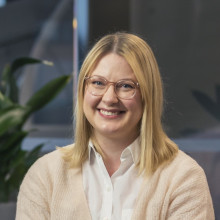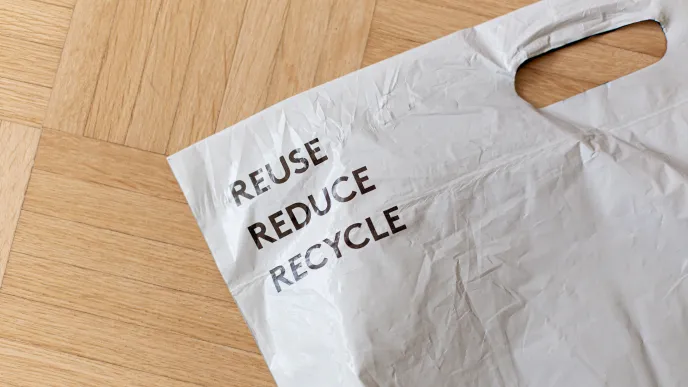
Finnish companies do a great deal of good work for the environment but don’t necessarily have the nerve to talk about it to the world beyond the company’s walls.
“It’s called greenblushing, and it’s been studied extensively. Greenblushing means that an organization doesn't dare speak up about its actions on sustainability for fear of public backlash. A common concern is being called out for greenwashing. In other words, the public may perceive sustainability-related marketing as unfounded,” says Research Council of Finland’s Post-doctoral Researcher Jenni Sipilä, who works at LUT Business School.
Sipilä has received funding for her sustainable consumption research from the Research Council of Finland. She points out that research has identified greenblushing as a damaging phenomenon. If no one talks about their environmental actions, ideas don’t spread, there's no dialogue, and no progress is made in sustainability.
“Even the related competitive edge remains untapped potential,” Sipilä remarks.
Communication focuses on weaknesses
Communication about environmental actions was discussed in a sales research conference in Lahti, Finland, November 2023. The conference culminated in a panel discussion on the clothing industry. One of the panellists was Sami Sykkö, LUT’s professor of practice and fashion influencer.
The large environmental footprint of the clothing industry is a reality, but Sykkö claims the fashion industry has responded to the demand for sustainability in a very noticeable way. Sykkö has been surprised by how the clothing industry has a strong tendency to shine a spotlight on the industry’s problems.
“No other industry I know is as hard on itself as the clothing industry – regardless of fast fashion giants having launched clothing lines out of recycled materials and our domestic brands such as Ivana Helsinki having set an example by dramatically reducing their production volumes,” Sykkö analyzes.
Sykkö mentions smart phone manufacturers as an example of the opposite approach: they’re keeping quiet about how they burden the environment by steering consumers to purchase new phones at short intervals. For example, they no longer offer system updates for their older models. Even though it’s prudent to switch to newer models for information security reasons, phones are still products of planned obsolescence. In other words, they’re designed to have a short life cycle.
“Companies should bear in mind that not everything needs to be perfect. They can still talk about how they promote sustainability and responsible business practices,” Jenni Sipilä says.

Did you know?
New technology helps to reduce the burden on the environment. LUT Business School’s recent dissertation suggests that augmented reality (AR) technology reduces the number of product returns and promotes environmentally friendly purchasing behavior.
“When consumers are able to try on products virtually and make more informed purchase decisions, it’s easier to avoid unnecessary product deliveries and reduce packaging waste,” says Junior Researcher Virginie Lavoye.
The choices consumers make are also important. A research team focusing on material cycles of textiles and plastics at the LAB University of Applied Sciences has observed that the clothing industry could reduce its greenhouse gas emissions by over 40 percent merely by doubling the current useful life of clothing items.
Greenblushing means:
- Assuming your annual (or biannual) sustainability/corporate social responsibility is enough
- Telling only the stories you are asked about
- Shying away from the tougher topics
- Neglecting to leverage your achievements internally
- Feeling that what you’re doing is “not that special”
- Assuming some stakeholders don’t care or don’t need to know
Source: Sustainable Brands
New sales conference in Lahti
Finnish Sales Research Conference (FSRC) was arranged in Lahti for the first time. Jarkko Niemi, assistant professor at LUT Business School, says that the two-day event drew nearly 30 people.
“The sales research field is evolving in Finland, but the network between universities is not very strong. The main aim of the conference was to offer researchers an easy-access academic platform to present their ongoing research and network with other researchers,” Niemi explains.
Junior Researcher Titta Pitman sees that the conference achieved its goal.
“In my opinion, the most important outcome was enabling researchers to meet and discuss sales extensively. The objective was to help everyone move forward in their own research and tackle challenges they’ve encountered. It felt as if we got together with friends to solve sales research problems,” Pitman describes.
The conference was mainly targeted for Finnish researchers, but the doors were also open to participants from other countries. According to Pitman, the significance of the topic area was what sparked the liveliest conversations. Pitman says sales is changing at a rapid pace and we need research in order to understand the phenomenon.
“Digitalization and related technologies, such as artificial intelligence and the metaverse (a virtual, interactive 3D world) are at the core of sales research. Sales professionals need to not only show results but also acquire new skills to achieve those results. In a sales organization, this leads to stress, anxiety, and burnouts,” Pitman assesses.
The discussions revealed that managers play a key role in enabling sales professionals to do their job successfully without burning out amid all the changes.
Professor Deva Rangarajan (IÉSEG School of Business, Paris, France) talked about the digitalization of sales and its impacts on the mental health of sales professionals and sales managers. Professor Petri Parvinen from the University of Helsinki gave a presentation on Finnish sales research. Kim Salvén, vice president of sales and marketing at the Peikko Group, and Timo Tuomi, customer success manager at Vainu, also contributed to the discussions.
Jarkko Niemi says the FSRC will undoubtedly be held again because the experiences were so positive.
The Finnish Sales Research Conference (FSRC) took place on LUT’s Lahti campus 11–12 October 2023.
More information:
Sustainable consumption
Research Council of Finland’s Post-doctoral Researcher Jenni Sipilä
+358 50 5694187
jenni.sipila@lut.fi
Sustainable fashion
Professor of Practice Sami Sykkö
+358 40 5187333
sami.sykko@lut.fi
Sales research
Assistant Professor Jarkko Niemi
+358 50 5956436
jarkko.niemi@lut.fi





